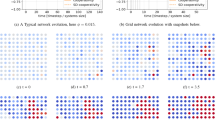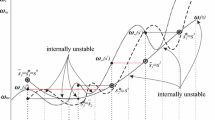Abstract
It has been assumed that public or collective goods, such as resource conservation or pollution reduction, will not be created or maintained since rational actors in the international system will choose to consume these goods while avoiding the cost of preserving them. I argue that on the contrary private and public goods are so interrelated that cooperative coalition behavior over their generation is possible. The problem of the maintenance of such cooperative coalitions, via an internal bargaining process, is considered. It is suggested that local optimizing behavior by a coalition may bring about qualitative change in the system, to the extent that the stability of the coalition is destroyed. Such a catastrophic change could lead to entirely new patterns of cooperation, and hence to qualitatively different development paths for the economic and ecological system.
Similar content being viewed by others
References
Arrow, K. J., and Hahn, F. H. (1971).General Competitive Analysis. Holden-Day, San Francisco.
Cairncross, F., and McRae, H. (1975).The Second Great Crash. Methuen, London.
Forrester, J. W. (1971).World Dynamics. Wright Allen Press, Cambridge, Mass.
Galtung, J. (1973). The limits to growth and class politics,Journal of Peace Research X: 101–114.
Hardin, G. (1968). The tragedy of the commons. Reprinted in Daly, H. E. (ed.),Toward a Steady State Economy (1973), W. H. Freeman and Co., San Francisco.
Hardin, R. (1971). Collective action as an aggreable n-person prisoners' dilemma.Behavioral Science XVI: 472–481.
Heilbroner, R. L. (1975).An Inquiry into the Human Prospect. Calder and Boyers, London.
Malthus, T. R. (1798, 1970).An Essay on the Principles of Population (A. Flew, ed.). Penguin, Middlesex, England.
Meadows, D. H., Meadows, D. L., Ronders, J., and Behrens, W. (1972).The Limits to Growth. Potomac Publishers, London.
Mesarovic, M., and Pestel, E. (1975).Mankind at the Turning Point. Hutchinson, London.
Olson, M. (1968).The Logic of Collective Action. Schocken, New York.
Olson, M., and Zeckhauser, R. (1966). An economic theory of alliances. Reprinted in Russett, B. (ed.),Economic Theories of International Relations (1968), Markham, Chicago.
Pavitt, K. L. R. (1973). Malthus and other economists. In Cole, H. S. D., Freeman, C., Johoda, M., and Pavitt, K. L. R. (eds.),Thinking about the Future: A Critique of “The Limits to Growth,” Chatto and Windus, London.
Peters, J., and Thissen, W. (1974). Investigation into the disaggregation of the Club of Rome's world model. Technische Hogeschul, Eindhoven, Holland, mimeograph.
Ricardo, D. (1911).Principles of Political Economy and Taxation. Dent, London.
Russett, B. M., and Sullivan, J. D. (1971). Collective goods and international organisation.International Organization XXV: 845–865.
Schofield, N. (1975). A game theoretic analysis of Olson's game of collective action.Journal of Conflict Resolution 19:441–461.
Smale, S. (1973). Global analysis and economics I: Pareto Optimum and a generalization of Morse Theory. In Peixoto, M. (ed.),Dynamical Systems, Academic Press, New York.
Thom, R. (1972).Structural Stability and Morphogenesis: Essay on a General Theory of Models. Benjamin, Reading, Mass.
von Neumann, J., and Morgenstern, O. (1944).The Theory of Games and Economic Behavior. John Wiley and Sons, London.
Author information
Authors and Affiliations
Rights and permissions
About this article
Cite this article
Schofield, N. The logic of catastrophe. Hum Ecol 5, 261–271 (1977). https://doi.org/10.1007/BF00891280
Issue Date:
DOI: https://doi.org/10.1007/BF00891280




